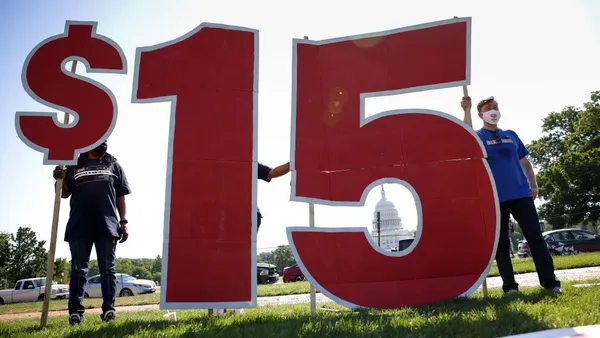Dive Brief:
-
A jury ruled in favor of El Pollo Loco franchise owners, who claimed the company supplanted franchisee business by building new restaurants too close to existing ones, Bloomberg reported. The Costa Mesa-based chain must revise its franchisee contract before securing additional leases.
-
The temporary halt will likely diminish strong 2018 sales, which have driven the company’s stock up 60%, and slow promotional efforts planned for next year. Same-store sales fell about 1% in the first quarter of 2018 before gaining 1% in the most recent earnings report.
-
In an email to Restaurant Dive, the franchisees' attorney confirmed that this decision sets another precedent in an ongoing case started by the owners of a 20-year-old store in Lancaster, California. In May, a jury ordered the company to pay $8.8 million to Michael and Janice Bryman. El Pollo Loco appealed that ruling as well as Friday's, saying it will negatively affect revenue and the chance to build in desirable areas.
Dive Insight:
Restaurant franchisees have been turning up the heat on their corporate overlords in the past year for a variety of reasons, but they tend to stem from slow sales growth, diminished marketing support, costly renovations or marketing flops. These pain points come are also compounded by uncontrollable market factors, such as more expensive labor.
El Pollo Loco has been embroiled in franchisee lawsuits since 2016, when Michael and Janice Bryman alleged the company strategically planned new stores in Lancaster, California, to siphon profits from their 20-year-old restaurant. The couple said they received zero warning before the Mexican chain opened a company-owned store about two miles away in 2015 and another in 2016.
Late last year, a judge ruled in the Brymans’ favor, saying the provision allowing El Pollo to build a company store without considering the proximity of franchisees was “unconscionable,” Nation’s Restaurant News reported in May. The Brymans’ restaurant garnered about $70,000 in monthly income, according to the lawsuit. During the trial, a company executive admitted that El Pollo considers adding a nearby store when an existing location surpasses $50,000.
The Mexican food chain vowed to also appeal the May ruling, which charged the company with violating the covenant of good faith and fair dealing, and the most recent decision. The plaintiffs' lawyer argues the decision would change the franchisee-franchisor relationship for good, but others disagree it's that broad. Still, for a mid-sized chain like El Pollo, saturating an area risks cannibalizing business that needs more brand recognition and more loyal customers in general.
This conflict follows a wave of similar squabbles between restaurant operators and their corporate counterparts. McDonald’s franchise owners, for example, have organized to potentially form an association, due in part to gripes over slow sales amid expensive remodels. Jack in the Box owners have demanded a new CEO, a seat on the board and a marketing audit. An association of Canadian Tim Horton’s franchise owners filed a suit against parent company Restaurant Brands International for cost-cutting measures, an expensive renovation plan and delays in supply delivery, and then U.S. franchisees sued in May over a contract clause that keeps all disputes handled in Miami courts.
One of the issues could be the traditional franchise model itself. Modern quick-service restaurants looking to expand are increasingly opting for company-owned stores to maintain quality and consistency. If they do follow franchising, they want multi-unit operators, versus neophyte single-store owners, an approach Subway has long championed (though the sandwich giant has suffered setbacks since 2015).
Additionally, unit count has given way to a commitment to same-store sales growth, a model Chick-fil-A has captured particularly well with stores raking an average of $4 million in sales. Chick-fil-A uses a company-owned, franchisee-operated model that’s somewhat unique, and similar co-op models have been cropping up since the recession. No matter the growth strategy a restaurant embraces, one truth is important to remember: if franchisees aren't making money, the company isn't either.











